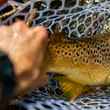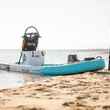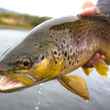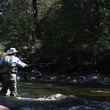What will states do with water that used to belong to all Americans?
That’s a question anglers need an answer to because western states and GOP lawmakers are mounting a full-court press to “take back,” as they put it, publicly owned lands and waters managed by federal agencies.
A plank in the GOP platform reads: “Congress shall immediately pass universal legislation providing for a timely and orderly mechanism requiring the federal government to convey certain federally controlled public lands to states. We call upon all national and state leaders and representatives to exert their utmost power and influence to urge the transfer of those lands, identified in the review process, to all willing states for the benefit of the states and the nation as a whole.”
And a GOP resolution entitled “In Support of Western States Taking Back Public Lands” reads as follows: “RESOLVED, That the Republican National Committee calls upon all national and state leaders and representatives to exert their utmost power and influence to urge the imminent transfer of public lands to all willing western states.”
States cannot “take back” existing public lands and waters because they never had them.
At the time of statehood, however, they were given some. As a condition for entering the union, most western states agreed to disclaim all right to unappropriated public property. In exchange, the federal government gave them “trust lands.”
The probable fate of public lands and waters that will be seized by western states if they and the GOP get their way is evident by what these states have done with their trust lands. They sold most of them off for development and resource extraction. And you can’t fish or hunt on lots of what’s left.
Nevada has sold off 99 percent of its trust lands, California 91 percent, Oregon 78.5 percent, Utah 55 percent, Idaho 41 percent, Colorado 38 percent, New Mexico 30 percent.
By their own laws western states must balance budgets, so any public lands and waters they acquire would likely be treated like trust lands.
Federal law requires that lands belonging to the American public be managed for “multiple use.” States have no such statute.
In Colorado, for instance, you may fish and camp on virtually all federal land. You may not fish or camp on most state trust land because it’s predominantly reserved for extractive industry. And if you float or wade any water in Colorado, you run the risk of being cited for trespass. River beds and banks belong to private landowners. What’s more, landowners don’t have to post their property, so you have no idea where it stops or starts.
In New Mexico, Arizona and Montana you can fish and hunt on federally managed land, but you must pay to do so on state trust lands. In New Mexico you may not camp or discharge a firearm on state trust lands.
Montana’s stream access law allows you to legally walk or wade below the high-water mark on any river. Do that in Wyoming and you can get fined.
This from Backcountry Hunters and Anglers: “We believe that streambed walking access, so essential to fishing and waterfowling opportunity, is not being discussed or defended at a national level — and sportsmen are literally losing ground in some states. Make no mistake. Though the opponents of public access may be a minority, their influence often exceeds our own. Through well-funded lobbying and political clout, these individuals are constantly seeking to erode the public’s rights to access our waterways. We have an upstream hike ahead of us, through heavy current.”
At statehood South Dakota did an inventory of what it called “meandered waters.” Anything over 40 acres was considered public, anything under was private or “non-meandered.” But land manipulation for agriculture — drain-tiling, for instance — converted non-meandered waters to huge impoundments, some flooding thousands of acres.
Nutrients in the rich soil created spectacular fishing opportunities, especially for walleyes. For decades there was de facto public access on these impoundments and connecting streams. But in 2014, in a bid to end that access, a small group of landowners filed suit against the state Game, Fish and Parks Department.
The South Dakota Supreme Court reversed the lower court’s finding for the plaintiffs in 2018. But, while the state’s constitution provides that surface water must be used for public benefits (consumption and irrigation, for example), recreation — including fishing and hunting — is not considered beneficial.
“In their decision, the supreme court ruled that it’s up to the state to determine beneficial use and access to the public,” says Rob Parkins, Public Waters Access Coordinator for Backcountry Hunters and Anglers “Instead of providing needed clarity on that question, the legislature kicked the can to Game Fish and Parks by setting up a one-way petitioning process that allows landowners to initiate closures of traditionally accessible waters. Lakes with extremely productive fisheries that the state has historically stocked and provided improved boat access for are now closed off with no trespassing signs and buoys. It’s a mess.”
To see what the law says about public access to waters in your state, head here.
There exists no better illustration of how states value your fresh and saltwater and the fish therein than the failed litigation joined by 21 states to guarantee continued fouling of Chesapeake Bay (provider of 75 percent of Atlantic striped bass).
The original suit, brought Oct. 8, 2013 by some of the nation’s most brazen polluters and polluter apologists, sought to enjoin Obama’s EPA from bringing the grossly impaired bay up to standards mandated by the Clean Water Act.
Joining the American Farm Bureau Federation (lead plaintiff), Pennsylvania Farm Bureau, National Association of Home Builders, Fertilizer Institute, U.S. Poultry and Egg Association, National Pork Producers Council, National Corn Growers Association, National Chicken Council and National Turkey Federation in this litigation were the following states: Alaska, Kansas, Arkansas, Utah, Wyoming, Michigan, Montana, Texas, Missouri, Nebraska, North Dakota, South Dakota, Oklahoma, Indiana, Alabama, Georgia, Kentucky, Louisiana, South Carolina, and West Virginia and Florida. Only one state (West Virginia) is partly in the Chesapeake watershed.
What the litigants feared were other region-wide pollution standards. They were fighting for freedom to keep creating anaerobic dead zones like the ones off Louisiana and Florida — miasmas of cyanobacteria, fertilizers, soil, silt and chemical poisons that excise oxygen and aquatic life.

Examining what motivated his home state of Florida to join the lawsuit — (and, by extension, the other 20 states) columnist, novelist and angler Carl Hiaasen offered this in the Miami Herald: “You can’t make this stuff up. They aren’t suing on behalf of the citizens of Florida; they’re suing on behalf of big agricultural and development interests that don’t want the U.S. Environmental Protection Agency enforcing clean-water laws anywhere. Meanwhile, whenever it gets rainy, the Army Corps of Engineers continues to pump fertilizer-laden water from Lake Okeechobee eastward down the St. Lucie River toward the Atlantic Ocean, and westward down the Caloosahatchee to the Gulf of Mexico.
“The people living around Stuart dread the dense algae blooms that suffocate the oysters and drive away sea life whenever that scummy green-black torrent from Lake O arrives. It’s a catastrophic violation of the federal Clean Water Act, committed by a federal agency on a seasonal basis.”
For the most part, sportsmen have been vocal and effective when it comes to keeping public lands in public hands. In 2017, when Rep. Jason Chaffetz (R-UT) filled legislation to sell off 3.3 million acres of federally managed public land anglers and hunters ate him alive, frightening him into quickly withdrawing his bill.
But sportsmen focus almost entirely on access. When it comes to state management of fish and wildlife on land owned by them and the rest of the public they are frequently no-shows or on the wrong side.
Consider Alaska’s takeover of national fish and wildlife refuges, facilitated by the Association of [state] Fish and Wildlife Agencies with assistance from fishing and hunting groups, Congress and President Trump.
It started with the Alaska Board of Game’s war on wolves and bears in a futile, 1920’s-style effort to convert the state to a vast Stop & Shop for moose and caribou meat.
Traditionally, the U.S. Fish and Wildlife Service has allowed states to manage wildlife on its refuges, but Alaska’s predator jihad was too much. The feds had to do something.
Enter then U.S. Fish and Wildlife Service director, Dan Ashe, an enlightened, competent public servant with a spine. “The Alaska Board of Game has unleashed a withering attack on bears and wolves that is wholly at odds with America’s long tradition of ethical, sportsmanlike, fair-chase hunting,” Ashe wrote in the Aug. 3, 2016 Huffington Post. “There comes a time when the U.S. Fish and Wildlife Service must stand up for the authorities and principles that underpin our work and say, ‘no.’”

While the immediate issue was mammalian predators, Alaska also manages fish on national wildlife refuges, and the state’s record with bears and wolves should have terrified anglers. But both anglers and hunters appeared singularly unmoved and unconcerned.
In fact, 33 groups representing the nation’s sportsmen signed a letter written by the Association of Fish and Wildlife Agencies savaging Ashe and his agency and defending state takeover of fish, wildlife and land owned by all Americans.
Signatories included the Pope and Young Club, Quail Forever, Orion the Hunters Institute, Pheasants Forever, Wild Sheep Foundation, Rocky Mountain Elk Foundation, Boone and Crockett Club, Ducks Unlimited, Quality Deer Management Association and Safari Club.
The hypocrisy of these and most of the other 23 groups was remarkable. They’d been in full cry about the need to keep public lands in public hands.
“Transferring or selling these lands to states … may also close the door to public access for hunters, anglers, hikers and others,” the Rocky Mountain Elk Foundation had proclaimed.
“As sportsmen-based organizations, we are alarmed that some decision makers are promoting the idea that federal public lands should be transferred to individual states,” read a joint statement from the Wild Sheep Foundation, Pope and Young Club, Quail Forever, Orion the Hunters Institute and Pheasants Forever.
“Federal lands are the foundation of the most successful conservation system in the world,” the Boone and Crockett Club had effused.
“We do not believe it would be constructive to … liquidate the national interest in federal land management,” Ducks Unlimited had piously declared. But from its virtual silence DU appeared perfectly okay with the armed seizure, trashing and 41-day occupation of the Malheur National Wildlife Refuge, established for waterfowl.
This lobbying by states and national sportsmen’s groups to let state bureaucrats seize control of fish and wildlife belonging to all Americans on land belonging to all Americans convinced Congress and President Trump to repeal the Fish and Wildlife Service’s management authority in Alaska.
So far there’s scant indication of how this will affect fish populations. But on federal lands in Alaska, wolves and wolf pups may now be killed in their dens and gunned down from planes. And brown and grizzly bears, along with their cubs, may now be shot over bait.
Even as I write, the self-destructive mantra from western politicians, much of the public and even some sportsmen continues. Basically, it’s this: “States care more about their lakes and rivers than desk-bound, D.C. bureaucrats.” “No one understands and loves local resources better than local stakeholders.” “Managers who grew up on land and beside water can manage it better than feds from away.”
For those just weighing in, all that sounds like it might be right. It’s not.






























Comments
Anne Duncan replied on Permalink
“Managers who grew up on land and beside water can manage it better than feds from away.”
Okay, let's assume for a moment that they can. That doesn't mean they will. After forty years of working as a volunteer activist on state and local conservation issues, and watching high levels of shenanigans, I will state categorically that very often they don't and won't.
As one small example, I have respect for the good work of the federal Fish and Wildlife Service in my state of Iowa. The Iowa DNR, on the other hand, has many good staffers but is currently controlled and run by special interests that would make Aldo Leopold throw up.
As for the Chesapeake Bay issue, if you want to see what happens when state and local entities are left entirely to their own devices to protect water quality, I present, ladies and gents, ta-daaa! The Gulf Dead Zone. Which is basically expanding, and only shrinks temporarily when weather patterns have mercy.
While the health of the Bay has been improving markedly, most states in the Mississippi watershed are engaged in a contest to see which state officials can emit the most blather and hot air about reducing farm pollution while not reducing it and continuing to send massive amounts of it downstream. (Alas, Iowa deserves that prize.)
Short version -- What Ted said.
Pages